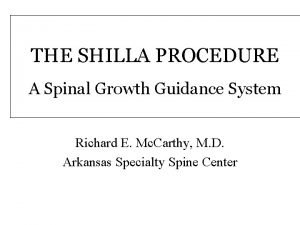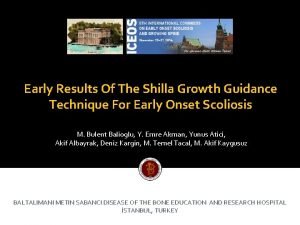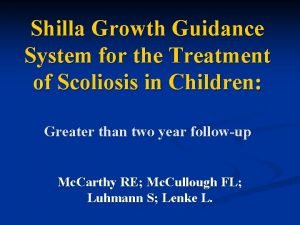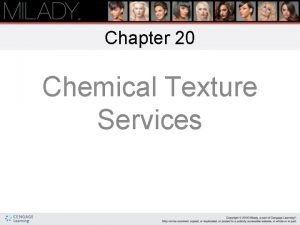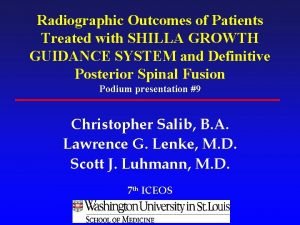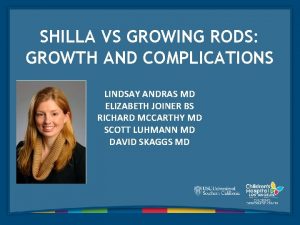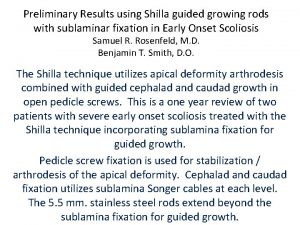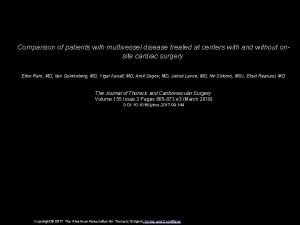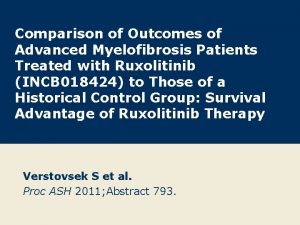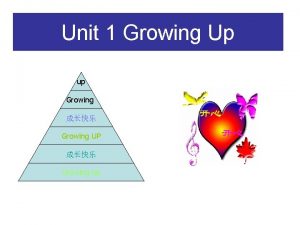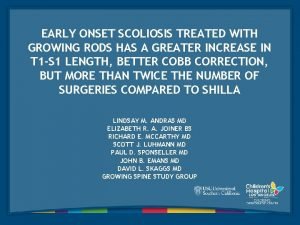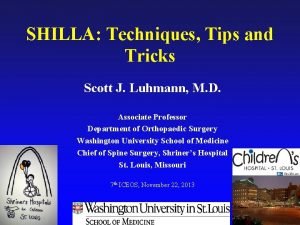A Comparison of Patients Treated with Shilla Growing












- Slides: 12

A Comparison of Patients Treated with Shilla Growing Rods for Early Onset Scoliosis 9 th International Congress on Early Onset Scoliosis November 19 -20, 2015 Drs. Wesley Greer, Richard Mc. Carthy, Paula Roberson Department of Orthopaedic Surgery Department of Biostatistics University of Arkansas for Medical Sciences Additional Support From UAMS Translational Research Institute Grant

What is Shilla? -Growth Guidance System for Early Onset Scoliosis -FDA approved in 2014, approved in Europe since 2012 -Developed by Dr. Richard Mc. Carthy and produced by Medtronics Early Onset Scoliosis- ”Scoliosis with onset less than the age of ten years, regardless of etiology” (Williams BA et al) Growth Guidance- ”Child’s own capacity for vertebral growth is harnessed for an increase in spinal height while directing the spinal alignment into as neutral a plane as possible” (Mc. Carthy RE)

Hypothesis • Increased surgical experience would lead to improved outcomes, with decreased revisions and implant failures when comparing patients early or late in the series • Increased rod diameter would decrease revisions and implant failures

Methods Retrospective chart review of first 70 patients undergoing Shilla technique. Minimum 2 year follow up 12 patients excluded Time: Early-4/04 to 4/08: 29 patients Late-5/08 to 12/12: 29 patients • Rod size: Small (3. 5 mm/4. 5 mm) 18 patients Large (4. 5 mm or 5. 5 mm) 40 patients • Statistics: Chi-square, T-test, Kaplan Meir curves • •

Early vs Late (OR Parameters) Variable Early Mean (std deviation) Late Mean (std deviation) p-value of two-sided two-sample t-test OR time – surgery 5. 10 (1. 07) 5. 49 (1. 55) 0. 28 (NS) OR time – anesthesia 6. 75 (1. 08) 7. 10 (1. 59) 0. 33 (NS) Blood loss 495. 7 (271. 5) 554. 5 (267. 9) 0. 41 (NS) Cell saver 197. 4 (153. 0) 184. 8 (123. 7) 0. 73 (NS) Transfused 211. 4 (183. 2) 170. 6 (169. 5) 0. 38 (NS) LOS 6. 48 (4. 90) 6. 34 (4. 37) 0. 91 (NS)

Early vs. Late (Shilla implants) Variable Early Mean (std deviation) Late Mean (std deviation) p-value of two-sided two-sample t-test Total # revisions 2. 07 (2. 58) 1. 14 (1. 46) 0. 10 (NS)* Total Shilla time 73. 21 (26. 57) 42. 38 (18. 65) <0. 0001 (significant)* Revisions/month 0. 032 (0. 042) 0. 039 (0. 069) 0. 65 (NS) Revisions in 2 years 1. 07 (1. 62) 0. 52 (0. 83) 0. 11 (NS)

Early vs. Late Time to Return to OR

Large vs. Small Rods (Shilla Implants) Variable Large (n=40) Mean (std deviation) Small (n=18) Mean (std deviation) p-value of two-sided two-sample t-test Total # revisions 1. 15 (1. 53) 2. 61 (2. 87) 0. 01 (significant)* Total Shilla time 54. 6 (28. 39) 64. 89 (24. 91) 0. 19 (NS)* Revisions/month 0. 031 (0. 059) 0. 045 (0. 052) 0. 40 (NS) Revisions in 2 years 0. 43 (0. 71) 1. 61 (1. 88) 0. 001 (significant)

Large vs. Small Rod Time to Return to OR

Large vs. Small rods (Causes of Implant Failure at First Revision) Variable Small Rods Large Rods P value of T-test Avg. Time to Screw Pull Out (Months) 3. 6 3 0. 29 (NS) Avg. Time to Rod Fracture (Months) 14. 5 44. 875 0. 01 (Significant)

Conclusion • Patients in the late group showed trends of improvement in increasing the time to returning to the OR. Early patients benefited during revisions of placement with larger rods. • Patients benefited with reduced returns to the OR by initial placement of larger diameter rods. Larger rods were more resistant to fracture and did not increase pull out of the screws. • Screw pull out is an early complication in patients which required earlier returns to the OR than for rod fracture which generally occurred later in the course of treatments.

References • Williams BA, Matsumoto H, Mc. Calla DJ, et al. Development and Initial Validation of the Classification of Early-Onset Scoliosis (C-EOS). J Bone Joint Surg Am 2014; 96: 1359 -67. • Mc. Carthy RE, Mc. Cullough FL. Shilla Growth Guidance for Early Onset Scoliosis at Five Year Follow-Up. J Bone Joint Surg Am 2015 Future Pub.
